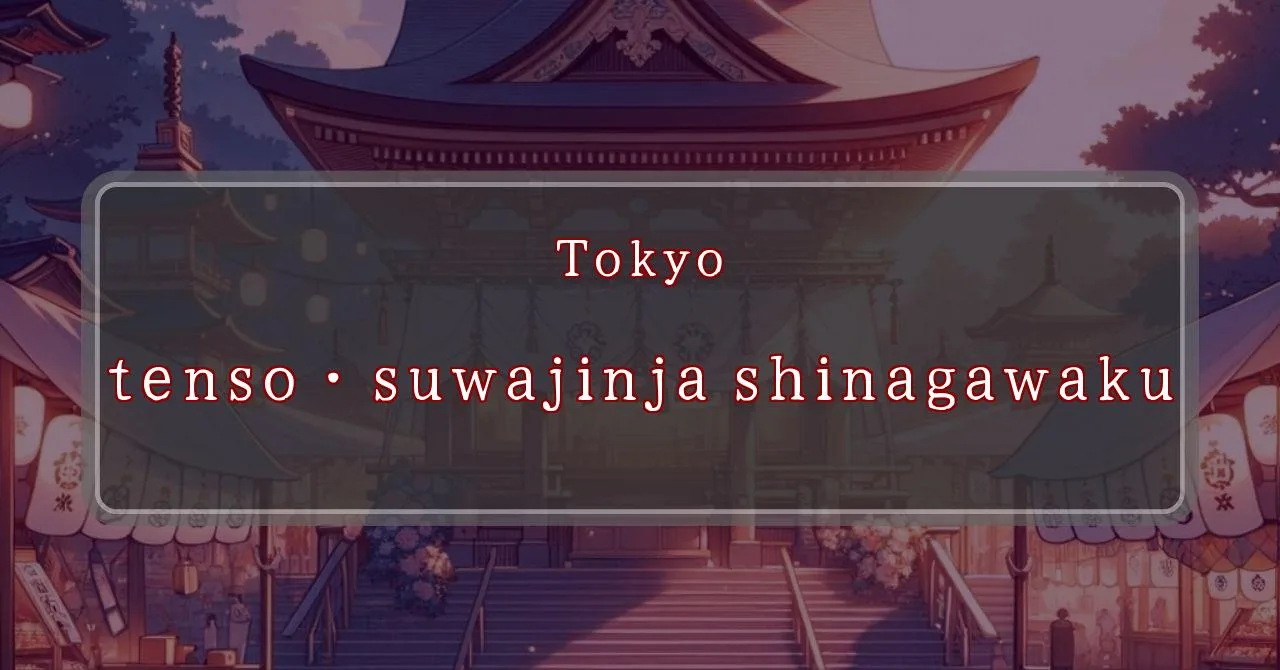Gleaming shrine, vibrant festival, rich history.
Basic Information
Tensou Suwa Shrine is a Shinto shrine located in Shinagawa, Tokyo, Japan.
- Address: 1-4-1 Minami-Oi, Shinagawa-ku, Tokyo 140-0013
- Phone Number: 03-3765-2061
- Access: 1-minute walk from Tachiaigawa Station on the Keikyu Line
- Festival Days: September 16th and 17th, 2024 (Reiwa 6)
Main Events and Attractions of the Festival
The Tensou Suwa Shrine Festival is a lively and colorful event that attracts many visitors each year. The main events and attractions of the festival include:
Mikoshi Procession
A highlight of the festival is the mikoshi procession, where a portable shrine is carried through the streets of Shinagawa by teams of people. The mikoshi is decorated with colorful tapestries and streamers, and it is believed that carrying it brings good luck and fortune.
Kagura Performance
Kagura is a traditional Japanese performing art that combines music, dance, and storytelling. During the Tensou Suwa Shrine Festival, kagura performances are held at the shrine’s main hall. These performances are a beautiful and unique way to learn about Japanese culture and history.
Food Stalls
No Japanese festival is complete without food stalls! At the Tensou Suwa Shrine Festival, there will be a variety of food stalls selling everything from traditional Japanese dishes to international cuisine. Be sure to try some of the local specialties, such as taiyaki (fish-shaped cakes filled with sweet red bean paste) and yakitori (grilled chicken skewers).
Games and Activities
There will also be a variety of games and activities for people of all ages to enjoy at the festival. These include traditional Japanese games like ring toss and goldfish scooping, as well as more modern games like face painting and balloon animals.
Blessings and Deities
Tensou Suwa Shrine is dedicated to four deities: Amaterasu Omikami, Toyouke Omikami, Takehaya Susanoo no Mikoto, and Ousu no Mikoto. These deities are believed to bring blessings of good fortune, prosperity, and protection.
- Amaterasu Omikami: The sun goddess and the most important deity in the Shinto pantheon. She is believed to bring blessings of good fortune and prosperity.
- Toyouke Omikami: The goddess of food and agriculture. She is believed to bring blessings of a bountiful harvest and good health.
- Takehaya Susanoo no Mikoto: The god of the sea and storms. He is also known as a powerful warrior and protector. He is believed to bring blessings of protection against evil and misfortune.
- Ousu no Mikoto: The son of Amaterasu Omikami and Susanoo no Mikoto. He is believed to bring blessings of good luck and success.
Origin and History
The origins of Tensou Suwa Shrine are unclear, but it is believed to have been founded sometime in the 11th or 12th century. The shrine was originally located in two separate locations, but it was merged into a single shrine in the 1960s. Tensou Suwa Shrine is now a popular destination for worshippers and tourists alike.
- Founded: 11th or 12th century
- Original location: Two separate locations
- Merged: 1960s
- Current status: Popular destination for worshippers and tourists
Tips and Notes for Visitors
If you are planning to visit Tensou Suwa Shrine, here are a few tips and notes to keep in mind:
- The shrine is open daily from 9:00 AM to 5:00 PM.
- Admission is free.
- There is a small parking lot available for visitors.
- The shrine is a popular destination for weddings and other ceremonies, so it is best to avoid visiting during these times if you are looking for a quiet experience.
- There are several restaurants and shops located near the shrine.
Parking Information
There is a small parking lot available for visitors to Tensou Suwa Shrine. The parking lot is located behind the shrine, and it can accommodate about 20 cars. The parking fee is 500 yen per day.
Popular Stalls and Food Carts in Recent Years
| Type of Stall | Description |
|---|---|
| Takoyaki | A staple at Japanese festivals. Characterized by a crispy outside and a creamy inside. |
| Jaga Butter | A simple yet popular snack of hot potatoes lavishly topped with melted butter. |
| Baby Castella | Small castella cakes, sweet and fluffy treats enjoyed by children and adults alike. |
| Grilled Ayu with Salt | Fresh ayu fish grilled whole with salt, a savory taste of Japanese summer. |
| Shaapin | A unique gourmet item influenced by foreign cuisine, with a chewy skin wrapping the filling. |
| Okonomiyaki | A Japanese grilled dish where you often choose your own ingredients for a personalized flavor. |
| Cotton Candy | A fluffy, sweet snack that’s extremely popular with children. |
| Chocolate Banana | A banana coated in chocolate, a fun and visually appealing dessert. |
| Kushiyaki | Various types of ingredients skewered and grilled, an easy-to-enjoy snack. |
| Yakisoba | Fried noodles mixed with a special sauce, a fast food favorite in Japan. |



